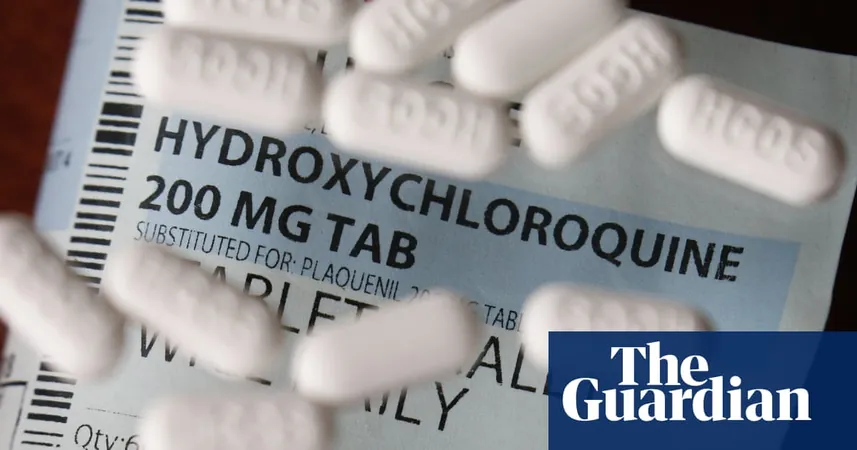
Hydroxychloroquine Study Retraction Sparks Outrage: The Medical Community Reacts
2024-12-18
Author: Amelia
Introduction
In a seismic shift for Covid-19 treatment discourse, a controversial study advocating hydroxychloroquine—an antimalarial medication—as a remedy for the virus has been officially retracted by its publishing journal, igniting widespread reactions in the scientific community.
Retraction Announcement
On a significant day in academic ethics, Elsevier, the Dutch publishing powerhouse behind the International Journal of Antimicrobial Agents, announced the withdrawal of the March 2020 study. The retraction comes on the heels of serious ethical concerns regarding the research, including compliance with publishing ethics and the handling of human subjects.
Author Concerns and Investigations
In a retraction notice, Elsevier disclosed that several of the authors themselves raised alarms about the study's methodology and conclusions. An exhaustive investigation by Elsevier’s research integrity team revealed multiple alarming issues, with the journal failing to ascertain whether proper ethical approval was obtained prior to involving study participants.
Ethical Issues in Trial Design
The controversy deepens as it was reported that key factors in the study—including whether there was a balance, or equipoise, between treatment patients and control patients—could not be confirmed. Equipoise, which represents a genuine uncertainty among experts regarding the favored treatment, is essential for ethical clinical trials. The journal also could not verify whether informed consent was gathered from participants who received azithromycin as part of the treatment regime, as outlined in the original study, which asserted that hydroxychloroquine's effectiveness would be enhanced alongside the antibiotic.
Authors' Reactions
The fallout from this retraction is profound. Three of the original authors—Johan Courjon, Valérie Giordanengo, and Stéphane Honoré—publicly distanced themselves from the paper, voicing concerns about how the results were presented and interpreted. In stark contrast, other authors maintain their support for the study and disputed the grounds for the retraction.
Impact of the Study
This study holds the dubious title of being the highest-cited Covid-19 research to be withdrawn, as reported by Nature, marking it as the second-most cited retracted paper in history. The implications of its promotion were far-reaching: in March 2020, the US Food and Drug Administration (FDA) granted emergency use authorization for hydroxychloroquine, unleashing a wave of stockpiling and distribution among hospitalized Covid-19 patients. The push for hydroxychloroquine was amplified by then-President Donald Trump, who labeled it a 'miracle drug,' even claiming to use it as a precaution.
Contradictory Findings
However, a stark contrast emerged earlier this year when research published in the peer-reviewed journal Biomedicine & Pharmacotherapy unveiled that patients treated with hydroxychloroquine had an 11% higher risk of succumbing to Covid-19.
Reactions from Medical Societies
In the wake of the retraction, the French Society of Pharmacology and Therapeutics issued a bold statement condemning the study as marked by 'scientific misconduct' and data manipulation, aimed at unjustly promoting hydroxychloroquine as an effective treatment. Their statement echoed a critical warning: the reckless promotion of unproven treatments carries monumental risks, potentially leading to avoidable harm and loss of life.
Conclusion
'This study fueled global scandal and misled millions into unnecessary risk-taking, betraying the core tenet of medicine: primum non nocere—first, do no harm,' the Society declared. The retraction fuels ongoing debates about urgency versus ethics in medical research, especially during crises like the Covid-19 pandemic. As the medical community grapples with the lessons learned, one thing remains clear: rigorous scrutiny and ethical integrity are non-negotiable in the pursuit of scientific truth.









 Brasil (PT)
Brasil (PT)
 Canada (EN)
Canada (EN)
 Chile (ES)
Chile (ES)
 España (ES)
España (ES)
 France (FR)
France (FR)
 Hong Kong (EN)
Hong Kong (EN)
 Italia (IT)
Italia (IT)
 日本 (JA)
日本 (JA)
 Magyarország (HU)
Magyarország (HU)
 Norge (NO)
Norge (NO)
 Polska (PL)
Polska (PL)
 Schweiz (DE)
Schweiz (DE)
 Singapore (EN)
Singapore (EN)
 Sverige (SV)
Sverige (SV)
 Suomi (FI)
Suomi (FI)
 Türkiye (TR)
Türkiye (TR)